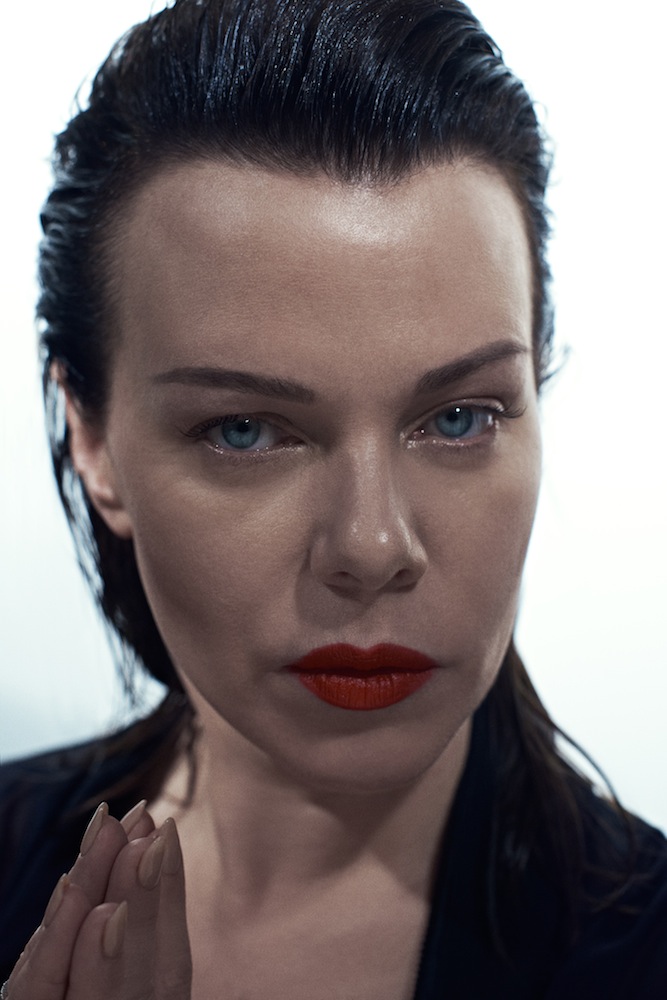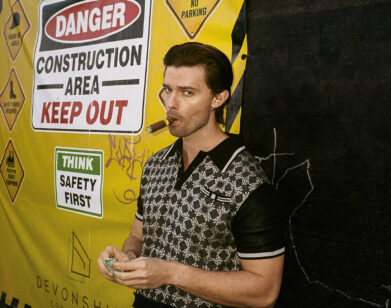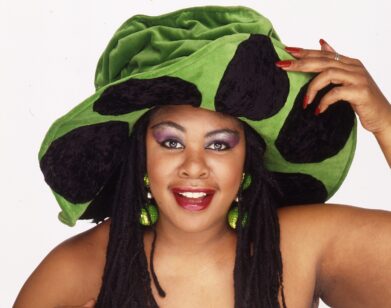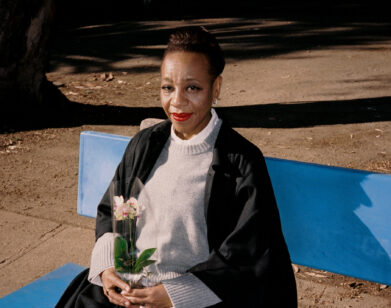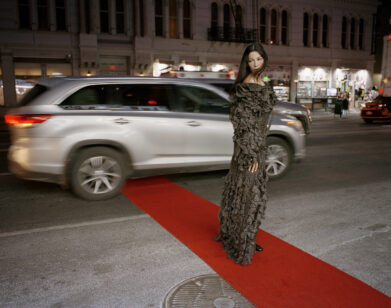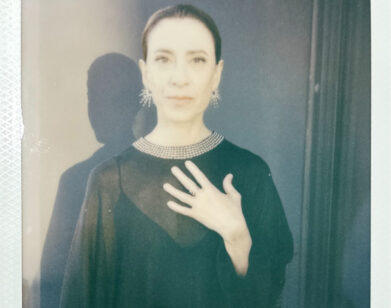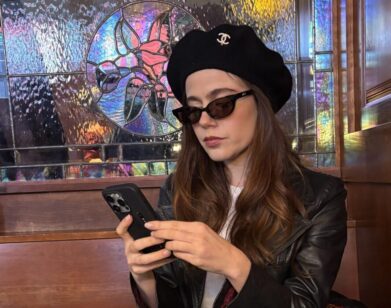Debi Mazar’s History of New York
DEBI MAZAR IN NEW YORK, MAY 2015. PHOTOS: ARKAN ZAKHAROV. STYLING: SAVANNAH WHITE. HAIR: OWEN GOULD/THE WALL GROUP USING SACHAJUAN. MAKEUP: SIMONE OTIS/JED ROOT USING NARS . MANICURE: NATALIE PAVLOSKI/LMC WORLDWIDE USING NCLA.
Between nostalgia-inducing ’90s movies like Goodfellas, Spike Lee films, Empire Records, Singles, and even Beethoven’s 2nd, and television shows like Entourage, everyone knows Debi Mazar. The native New Yorker is a character actress par excellence; the sort of name you find in character breakdowns as a shorthand for independent, brassy, and quick-witted. But Mazar wasn’t always an actress; before being cast by Martin Scorsese in her first official film, Mazar was a dancer, a downtown scene-stealer, and a fashionista. She worked the door at the Mudd Club, cut Andy Warhol’s wig (a sort of mock haircut) in the Interview offices, appeared in Madonna videos, dated graffiti artists, partied with Basquiat and Keith Haring, and made a successful living as a makeup artist. And her interests today extend far beyond the film and television industry: she collects furniture, jewelry, and photography, is a close friend of New York fashion designers like Marc Jacobs and Zac Posen, has a farm in Italy, and a cooking channel show, Extra Virgin, with her husband Gabriele Corcos.
With the Entourage movie coming out this week and Mazar resuming her role as the no-nonsense publicist Shauna, and with the first season of Darren Star’s Younger, in which Mazar plays the no-nonsense best friend to Sutton Foster’s protagonist, we decided it was time for a catch-up.
DEBI MAZAR: Hi Zac, how are you doing? Busy?
ZAC POSEN: Very busy. We have the Tony Awards coming up and the CFDA Awards and our two collections for Resort.
MAZAR: Oh my goodness. I love seeing everything on Instagram. And you have Brooks Brothers and Delta Airlines…I love it. It’s kind of old school.
POSEN: We’re both kind of old school. We’re New Yorkers. But we really met on Instagram.
MAZAR: We met on Instagram. It’s so funny, I had a dear friend who’s a Cuban tailor and he was cutting for you. He was saying, “Zac is fabulous.” You reminded me so much of a Jacob Riis picture of a Jewish boy from the Lower East Side from the turn of the century, you just have that beautiful look to you. Then when I would read your interviews, I’d imagine you running around SoHo as a child, because when I was a young teen, I would run around SoHo, but it was then a trucking area. There was a pepper factory on Grand Street. It was rough. I used to go over to, may she rest in peace, Mary Ellen Mark’s. At the time she was doing a documentary on a girl named Tiny.
POSEN: I used to watch Mary Ellen Mark all the time in the neighborhood. I was mesmerized by her braids before I was even aware she was a photographer. And just the way she watched people in the neighborhood. She really had a gaze and was attuned to the street.
MAZAR: I remember I asked you to be on an episode of Extra Virgin, my cooking show, just because you have your own sort of Instagram cooking show, #CookingwithZac. You have the most wonderful china, and the dishes you make are fantastic. It was funny because I remember you talking about seeing me, or knowing who I was, when you were younger.
POSEN: I was aware of you as far back as I can remember. It was partially the time period in New York and the movies and the music videos. I’m born into MTV—the first things I can remember watching on MTV are “Thriller” and “True Blue.”
MAZAR: [laughs]
POSEN: Then when I was about seven, I went to school with Nina Clemente. I don’t remember if she had photos of you, or talked about you a lot.
MAZAR: I was at her parents’ apartment a lot—Francesco and Alba.
POSEN: I would go there everyday after school.
MAZAR: I may have even met you when you were a mere child….
POSEN: We met in person finally at Madonna’s Christmas party that she has at her house, which was so nice because it was so intimate.
MAZAR: You and I were wearing matching colors—we were both wearing a dark garnet. You had this beautiful velvet suit and I was wearing patent leather. We connected and I fell in love with you because, aside from the fact that you’re so modern and detail-orientated, you also had a poodle.
POSEN: We have the poodle connection for sure. I’ve lived with poodles my whole life and I know you have Dolores.
MAZAR: I actually optioned Jacqueline Susann’s Every Night, Josephine! I wanted to turn it into a weekly series many years ago, but Jacqueline Susann‘s husband’s daughter got the estate and she wouldn’t let me have it. It’s just sitting there. Maybe she’ll read this interview and want to revisit it.
POSEN: Did you grow up in downtown New York?
MAZAR: Actually, no. I was born in Queens Village. My mother was 15. Her and my father—who was basically a ’50s greaser, first generation from Latvia—they lived with my grandmother. It wasn’t really going well. They had me on purpose, I think, to get out of the house and then they didn’t get out of the house. He was sort of a small time gangster-wannabe. They broke up, had the marriage annulled, and she moved into the village with her Cuban gay friends on 10th Street near the Russian Bath House. My mom moved around a lot—I was back and forth to Queens. In the ’70s she became a hippy and moved me to Upstate New York, which was devastating ’cause I was a city kid. There were no cell phones; our mailbox was a mile down the road because it was so rural everybody had to go to one area to get their mail. Our phone was on a “party line,” so you go to make a phone call and there would be other people talking on it. I was by myself, because my brothers and sisters didn’t come ’til eight years later with my mother’s next husband. It gave me a sense of curiosity. At the time, I hated it. I felt alone. For me to go visit a friend was nearly impossible. I had hippy parents; they were growing their own pot. I ended up finding my way through nature, which helped me when I met my current husband because we also have a house in an Etruscan town right above Florence in Italy.
POSEN: What does he grow there, his family?
MAZAR: We have about 20,000 olive trees. Some are really ancient. His mother’s house is from the 12th century. Our little country barn is from the 15th century. Aside from our olive orchards, we have apricots, we have cherries, wild boar running rampant.
POSEN: Are they dangerous?
MAZAR: They’re vegetarians and they’re very peaceful, but they’re dangerous when they have cubs. They will kill you and they slice you up with those tusks. When I look at them, I think, “Oh, gosh, they’re so cool!” They’re like huge wildebeests with bristly hair. Then I think of my Mason Pearson hairbrush, which is made from boar I believe, and I think about the delicious cinghiale sauce that I could be eating and how I should probably be a vegetarian, but it’s just so delicious. We also have deer and owls and pheasants.
POSEN: Do you make your own olive oil?
MAZAR: Oh yes. We have incredible olive oil. It’s so spicy and wonderful. It’s super green. We like to harvest it with the family as a tradition.
POSEN: I remember when I was younger thinking with you that you sort of had this Hedy Lamarr meets Betty Boop and Betty Page with the attitude of Rosalind Russell.
MAZAR: [laughs] I used to watch with my grandmother all of the old film noir movies on our black and white TV. I fell in love with film noir. Then, as I got older and started understanding cinema, I wanted to be in a Fellini film or Tura Santana from Russ Meyer’s Faster, Pussycat! Kill! Kill! (1965). Then I got into photography and then into modernism. There were just so many great looks. I fell into vintage only because I could not afford to go to a proper department store or open a fashion magazine. That was unattainable, so I had to get very creative. I would go into my Grandma’s closet, my mother’s closet. My grandmother had proper stockings and bed jackets and garter belts. My grandmother’s side of the family on my mom’s side is fifth generation New Yorker. They came over on the Mayflower, if you can believe it.
POSEN: How old were you when you came back to New York?
MAZAR: I came back to New York at 12 or 13.
POSEN: When did you start going out and dancing? When did the performance bug happen?
MAZAR: I ended up moving in with my godparents in Long Island. They gave me a stability that I needed at that moment. I stayed there for a couple of years, and then I started sneaking into the city, and there was a club called the Peppermint Lounge. I started popping into CBGBs and Max’s Kansas City. I was a kid. I wasn’t even supposed to be let in. I got some fake ID. Mickey Ruskin owned these clubs and he owned a restaurant called One U, at 1 University Place, and I became a waitress. Rene Ricard would come in and Sharon and Cookie and Linda Yablonsky…
POSEN: Did you immediately connect with Rene?
MAZAR: Oh yeah. He would come in and cause a scene and he liked me and he would put the jukebox on. Later on, obviously he was an art critic and I was friends with Basquiat and Keith Haring and Kenny Scharf.
POSEN: Were you collecting any art at that point?
MAZAR: Oh no. I was poor. I was going to art shows and drinking the free champagne at Mr. Chow’s whenever Keith would have a party and having lots of fun! Then I got a job at the Mudd Club. It started in the coat check and I worked my way up to working the VIP door. I think I was 16. I really didn’t know who the VIPs were. If David Bowie walked in, okay, I knew who that was, and of course Debbie Harry, but there were people walking in like David Byrne from the Talking Heads—people that were famous in the downtown scene. So it was kind of [Mudd Club owner] Steve [Mass]’s joke to have a child on the VIP door. I met a lot of people in that period. It was sort of when punk met new wave met hip-hop met art; it was this explosion of everything that was going on in the early ’80s. It was such a wonderful, inspirational time.
My first apartment was on Mott and Houston. It’s still there. The Lower East Side was all junkies [at the time]. I started reading stuff like Miguel Piñero. I love history, so I would walk the Lower East Side—I had read How the Other Half Lives by Jacob Riis—thinking about our relatives all came over from some place, passed through Ellis Island, and lived in fire escapes, stuffing 15 people into one room. It made me so hungry to understand more about the history of New York and the architecture and the people and Jewish theater and theater in general. I was hanging out with a very diverse group. All of them would take me under their wing—especially my gay friends—and take me to museums like the Metropolitan, take me to Film Forum to see Pasolini. I started doing makeup. I was good at doing makeup and I wasn’t really a club person. I liked to dance and I love music, but I like getting up early. I dragged my little makeup box from Brooklyn into the city. I met Madonna in the elevator at Danceteria. She became one of my first girl friends.
POSEN: Was she working the elevator there?
MAZAR: Well, she was working the elevator but it wasn’t because she was working there. She was hustling.
POSEN: I remember Francesco always telling me that he knew immediately that she was going to be it.
MAZAR: She had a presence. She was very raw, very sexual. She made direct eye-contact. She had her own style, and her style was really cool—she had that messy, dirty hair, but it looked beautiful. She had big eyebrows and tons of bracelets.
POSEN: What connected you to each other immediately?
MAZAR: She was like, “Hey, you wanna dance?” We danced to some cool little song on the floor. I was a good dancer because I was always hanging out with—pre-Paris is Burning—black and Puerto Rican queens who were fabulous. It was exciting because this was a white girl who could dance, like myself, and she was great. Then she told me her story: that she was from Detroit and she had studied with Alvin Ailey and had done some body modeling. She was just really interesting and free. She was like, “I’m going to be a star. I’m going to cut some records and you’re going to do my makeup.” Her first single was “Everybody.” She did it at the Paradise Garage and me and Keith and everybody went down to it and it was a super fun time. We didn’t ever know that she was going to be the star that she is. But it was incredible because like all of us, she was really interested in history, fashion, film, people, and she was able to transform and take ideas and use them on herself and transform herself, and I always admired that about her.
POSEN: Was Downtown 81 your first performance in film or on TV?
MAZAR: I don’t know. I never saw it. I think that might have been Maripol’s husband at the time, Edo [Bertoglio], but I don’t have a very good memory of it. I was always trying to jump into any kind of little project. A friend of my Joe McDevitt, a great makeup artist, would drag me to shoots and he brought me once to the opera. He was doing makeup for somebody in the opera and he had me assist him. I was backstage and I thought, “This is really amazing.” I was watching these wonderful performers paint themselves. I became interested in the theater and I started to see a few plays. Then Madonna did Goose and Tomtom (1986) and did Speed-the-Plow (1988), and I would do the makeup and hair. I would drag my makeup box up there, and after Madonna and Joe Mantegna and Ron Silver would leave the theater and nobody was there, I would go up on stage. I knew all the lines, and I would stand there and do the play. I think it was costume or Rosie who caught me. I was like, “Oh my god, I was just doing my thing.” And she was like, “No, girl. You’re fabulous. You should take some acting classes.” I was like, “Yeah. I kind of have this calling. I’m very outgoing and I’m a good mimic and I’m funny and I’ve lived sort of a hard life in terms of having a young mom and dealing with a lot of stuff. This could be really cathartic for me.” I started taking classes. I went to Herbert Berghof’s studio. I studied with Bill Hickey and Uta Hagen. I had another acting coach, Marcia Haufrecht, who was fantastic up in Times Square. I would audit classes at the Actor’s Studio and I fell into this thing of being a New York actor. I still dragged my makeup box everywhere, but at a certain point I had to give up jobs because I’d be working on a scene. My agent would be like, “You have to be at Clairol for a commercial shoot today at two o’clock,” and I’m like, “I can’t! That’s when I’m doing my scene and performing in front of my class.” I did that a few times and then my agent dropped me.
POSEN: Uh oh.
MAZAR: Well, sometimes in life you have to make a decision and make sacrifices, and I got lucky. I went into an agency and performed an entire monologue—it was from a John Patrick Shanley play—they loved me and they signed me. I had no résumé. I made up a fake one because this was pre-IMDb and they couldn’t check your stuff. I made up this really fabulous résumé. Then the ball started to roll. I did Goodfellas (1990) with Martin Scorsese and Spike Lee discovered me through Martin Scorsese, and then Oliver Stone. It was a tumbleweed that was rolling and building.
POSEN: It was meant to be. Why and when did you first go to Los Angeles, and what are your favorite architectural buildings or neighborhoods of Los Angeles?
MAZAR: The first time I went to L.A. was for Madonna’s wedding to Sean Penn.
POSEN: Oh wow.
MAZAR: Oh yeah. It was so awful because Lance Loud drove me. I just assumed I had a date. We drove up Pacific Coast Highway, I think it was at Johnny Carson’s house on the cliffs, and it was mind-blowing. I hadn’t really experienced the type of L.A. paparazzi madness that was about to happen. There were helicopters flying overhead, I couldn’t hear anything. I had a friend of mine make me this little outfit; I sort of looked like a genie, but I felt beautiful. I walked into the wedding in vintage springalators, and one of my heels stuck in between the wood planks walking down to where all the guests were and there was Cher, Steve Rubell, Warhol, Keith Haring. Everybody was there. I tripped into the wedding a little bit. Lance did not get in; they would not let me have my guest. We couldn’t get past the police. It was horrible—he had to go back. He’s in heaven now. But that was my first trip out there. I was staying with Madonna’s manager, Freddy DeMann, who lived right down the street from the Beverly Hills Hotel. I passed by that hotel, I saw those beautiful palm trees that were lit from the bottom and I thought, “This is fabulous.” There were gardenia plants and citrus trees.
POSEN: It smells so good in Beverly Hills.
MAZAR: I thought, “What am I doing in New York? I love New York, but I kind of want to come out and do this.” I started visiting people here and there, but after I did Goodfellas and after I did a couple of other movies in New York with Spike Lee, I heard about an audition in L.A. for a Stephen Bochco series called Civil Wars. William Finklestein wrote it. I got the job and ended up staying. I rented Taylor Negrón’s house in the Hollywood Hills, who became my dear friend, and it was just divine. Seymour Cassel, the fabulous actor, he was friends with Sean Penn and he would pick me up, because I didn’t know how to drive at the time, and he would take me around town and say, “This is where so-and-so used to live. This used to be the desert.” He gave me the whole old-Hollywood history. He would take me to Bullocks Wilshire. I started discovering a different type of architecture. I had already been to Miami because I grew up with a lot of Cuban friends, and before Miami became cool and they redid it, Morris Lapidus had done the Eden Roc and all of the fabulous buildings down there. So that was my first favorite, but then I went to L.A. and that was it. I decided to be bi-coastal. I started making some TV money then. I had a cheap rental in New York in London Terrace and my modern L.A. house. I fell in love with Spanish Moorish culture. I love Hancock Park. I love the flats; I’m not a canyon girl.
POSEN: Do you ever miss it?
MAZAR: I miss it every day. I miss space and sunlight.
POSEN: Was that when you started to invest in jewelry?
MAZAR: Yes it was.
POSEN: Because we both share that: knowing that stones and jewelry are good investments.
MAZAR: Jewelry, photography, and real estate. Because I didn’t have children at the time, and prices weren’t so high, I would collect pieces. Also my best friend at the time was a man named Neil Lane, and Neil hadn’t blown up in the way he’s so huge. So Neil would give me great prices and give me jewelry just being my friend. That’s also a walk through history. I love that I have daughters. I would have loved to have had a son, but one day my daughters will appreciate my stuff. My one daughter is like, “Mommy, can I have that when I’m older?” The older one isn’t really interested in any of my stuff yet, but she will be. Trust me.
POSEN: How lucky are they that they have a mom that’s so diverse and cultured and passionate.
MAZAR: They don’t know that.
POSEN: They will.
MAZAR: They just think I’m old and a little crazy. My daughter goes, “Mom, can you not wear that to my school show? Please don’t wear that turban! Can’t you look normal?” “No, Evelina, I’m going to wear whatever I want. I’m going to look different and it’s cool to be different.” You will never see me in mom jeans.
POSEN: I can’t even imagine it.
ENTOURAGE IS OUT NOW. YOUNGER AIRS TUESDAYS ON TV LAND.

